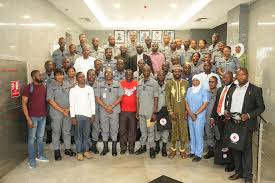In a proactive move to enhance the welfare and operational readiness of its personnel, the Nigeria Customs Service (NCS) has partnered with the Nigerian Red Cross Society (NRCS) to train its officers and men in first aid and emergency response techniques.
The training, which commenced at key commands across the country, is designed to equip Customs officers with critical lifesaving skills that can be deployed in both official operations and civilian emergencies. Given the often hazardous nature of border enforcement duties and patrol activities, the training is expected to significantly improve the service’s ability to manage health-related incidents on the frontline.
Speaking at the flag-off ceremony, a senior Customs official described the collaboration as a “vital capacity-building step that reflects our commitment to the safety of our personnel and the public we serve.” He added that the training aligns with global standards for emergency preparedness and the evolving demands of modern border security operations.
Officers participating in the programme are being trained in CPR, treatment of burns, management of fractures, handling of bleeding, and emergency evacuation techniques. Trainers from the Nigerian Red Cross lauded the Customs Service for prioritising health and safety, stressing that first aid competence often makes the difference between life and death in critical situations.
“This initiative by the Nigeria Customs Service is commendable. It shows a forward-thinking approach to operational safety. Accidents can happen at any time, especially in high-risk areas like border zones, and being able to respond effectively saves lives,” said a Red Cross trainer during one of the sessions.
Beyond operational contexts, the training also aims to encourage officers to act as first responders during public emergencies such as road accidents, communal conflicts, or natural disasters—especially in remote areas where access to medical help may be delayed.
The partnership with the Nigerian Red Cross reflects a broader commitment by the NCS to modernise its practices, boost morale, and position its officers not only as enforcers of trade and anti-smuggling laws but also as responsible public servants capable of providing humanitarian assistance when needed.
As the training continues across other Customs formations, stakeholders hope it will be institutionalised as part of regular capacity development—ensuring that officers are not only fit for duty but also equipped to protect lives in the line of service.







